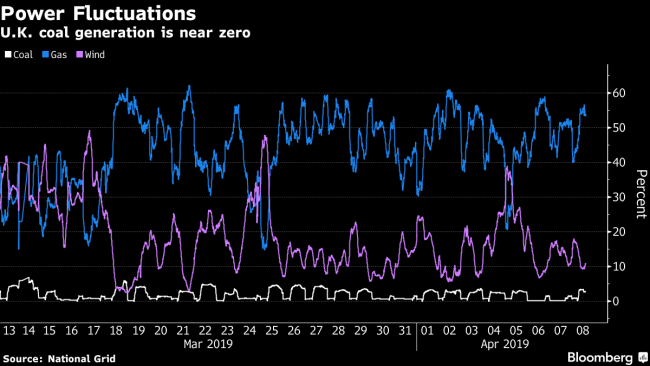(Bloomberg) -- Two years after Britain had its first coal-free day since the Industrial Revolution, the nation’s network operator is readying itself for life without any fossil fuels.
The grid may start dropping its need for natural gas power for short periods in about 2025, coinciding with coal’s complete phaseout. The system wants to be “zero-carbon capable” by then, said Julian Leslie, head of national control at National Grid (LON:NG) Plc’s electricity system operator.
While natural gas regularly provides more than half of the U.K.’s electricity, increasing wind and solar power output means the need for the fossil fuel is sometimes very low, falling below a quarter of usage on windy days.
To eliminate the need for fossil fuels, the U.K. will need to begin thinking about how to replace gas stations straight away, Leslie said. New market rules to retain transparency and competitive tension, as well as calls for tenders as early as next year for new types of equipment will also be needed.
“All of those things need to happen in order to make the zero-carbon-in-2025 aspiration happen,” Leslie said in a telephone interview. “In 2025, it may just be for half an hour, it may just be for an hour. Then gradually, in the years that follow, that time period will grow and grow.”
National Grid’s Electricity System Operator was created on April 1 as a legally separate entity within National Grid Plc. It’s aim is to promote competition on the U.K.’s power and gas network to the benefit of consumers.
Flywheels, Batteries
To keep the system balanced, the network may need new technology such as flywheels and supercharged capacitors, he said. Large coal and natural gas power stations give the network more resilience, known as inertia, because they have heavy spinning shafts and turbines, while solar and wind plants reduce grid stability as they are dependent on weather conditions.
Flywheel storage works by spinning a rotor at high speed to maintain energy in the network. Supercharged capacitors or condensers can deliver high volumes of electricity quickly, but the volume delivered is limited.
“Given the U.K.’s battery storage current and future capacity, I would have imagined the issue would have to be addressed closer to the 2030s,” said Diego Marquina, an analyst at Bloomberg New Energy Finance in London. “As a preemptive measure, it feels like it’s coming surprisingly soon.”
Without gas and coal, it’ll probably be crucial to create the systems to address network fluctuations to limit crashes and blackouts.
“It’s definitely short-term storage they are looking for here,” Marquina said. “There might be a risk for the grid if you are only relying on a few traditional spinning turbines such as from the nuclear reactors and biomass generation -- if one of those trips, then that might be very challenging to deal with.”
